Transcranial Magnetic Stimulation (TMS) is a non-invasive neurostimulation technique that employs electromagnetic induction to modulate neural activity in the brain. In TMS, a magnetic coil is placed on the scalp, producing brief magnetic pulses that penetrate the skull and influence the electrical activity of neurons in the targeted brain regions. This modulation of neural activity can lead to changes in neurotransmitter release and induce neuroplasticity, making TMS a therapeutic tool used in the treatment of various neuropsychiatric and neurological conditions. TMS is particularly recognized for its application in treating major depressive disorder (MDD) and has also shown promise in addressing conditions such as obsessive-compulsive disorder (OCD), anxiety disorders, and certain neurological disorders. It is considered a safe and well-tolerated procedure when administered by trained healthcare professionals.
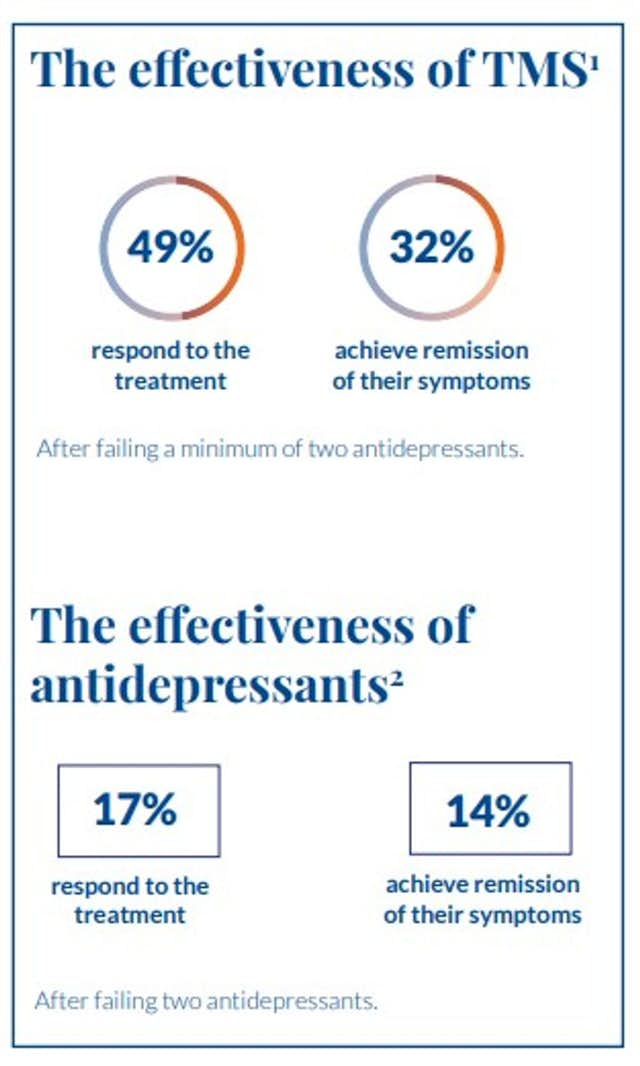
Transcranial magnetic stimulation (TMS) is an FDA-approved, non-invasive, non-systemic, and non-pharmacological treatment for major depression disorder (MDD), obsessive-compulsive disorder (OCD), smoking cessation, and migraines. We also treat anxiety and other mental health conditions.
TMS uses magnetic fields to stimulate nerve cells in the brain, specifically in areas involved in mood regulation. By stimulating these areas, TMS can help to ease symptoms and improve the mood of people struggling with major depression disorder (MDD), obsessive-compulsive disorder (OCD), anxiety, and other mental health conditions.
Neural Activation: Neuronal Excitation: The magnetic pulses induce small electrical currents in specific areas of the brain's cortex, stimulating nerve cells. This stimulation can activate or modulate neural networks involved in mood regulation, cognition, and emotional processing.
Neuroplasticity: Inducing Changes: TMS treatment is believed to influence neuroplasticity, the brain's ability to reorganize and form new neural connections. This process may lead to alterations in brain activity and function over time, potentially contributing to symptom relief in various mental health conditions.
Targeted Brain Regions: Precision Targeting: Different treatment protocols target specific regions of the brain associated with particular conditions. For instance, in depression, TMS often targets the dorsolateral prefrontal cortex, thought to regulate mood.
Modulating Brain Activity: Altering Brain Activity: TMS treatment can increase or decrease neural activity depending on the frequency and intensity of the magnetic pulses. High-frequency TMS may enhance brain activity in certain regions, while low-frequency TMS might decrease activity in others.
Therapeutic Effects: Treating Mental Health Conditions: TMS has shown efficacy in treating various conditions like depression, anxiety, OCD, and more. Its impact on neural circuits associated with these conditions is believed to alleviate symptoms and improve overall mental health.
Safety and Side Effects: Generally Safe: TMS is considered safe, with minimal side effects such as mild scalp discomfort or headache during or after sessions. Serious adverse effects are rare.
Integration with Therapy: Combined Approach: TMS is often used in conjunction with other therapies like counseling or medication for enhanced effectiveness. Combining treatments can potentially yield better outcomes for individuals with mental health conditions.
While the exact mechanisms underlying how TMS affects the brain are still being studied, the therapy's ability to modulate brain activity and induce changes in neural circuits holds promise for treating various mental health disorders. Individuals considering TMS should consult with healthcare professionals to determine if it's a suitable option for their specific needs.
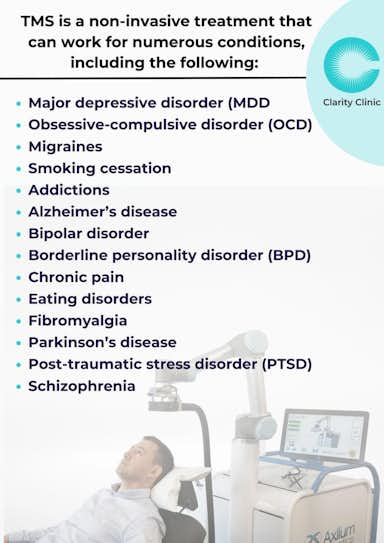
Transcranial Magnetic Stimulation (TMS) stands as a non-invasive therapeutic approach with applicability across various conditions, including:
1. Major Depressive Disorder (MDD): TMS is predominantly used in treating MDD, providing relief for individuals grappling with treatment-resistant depression. Through magnetic pulses, TMS targets specific brain regions responsible for mood and depressive symptoms.
2. Obsessive-Compulsive Disorder (OCD): Following successful outcomes in alleviating depression, the FDA approved TMS for OCD. For those unresponsive to conventional treatments, TMS offers an alternative by modulating brain activity to reduce compulsive behaviors and thought patterns.
3. Generalized Anxiety Disorder (GAD): TMS therapy becomes an option for individuals with GAD, especially when it comes as a symptom of other conditions like MDD or OCD. By targeting specific brain areas, TMS can alleviate anxiety symptoms by reducing excessive neural activity.
4. Post-Traumatic Stress Disorder (PTSD): TMS treatment is proven effective in reducing symptoms stemming from traumatic experiences. Combining TMS with cognitive therapy can address anxiety, worry, and fear by targeting specific brain regions associated with these symptoms.
5. Schizophrenia: TMS demonstrates potential in reducing auditory hallucinations by modulating overactive brain regions in schizophrenia patients. While its efficacy for visual hallucinations remains uncertain, individuals may find relief from specific symptoms.
6. Addiction: Research suggests TMS can curb nicotine cravings by influencing dopamine levels. This opens avenues for exploring its potential in treating various addictions tied to dopamine like tobacco, alcohol, cocaine and methamphetamine. However, further research is needed to establish its effectiveness across different types of addiction.
7. Chronic Pain: TMS emerges as a viable option for managing chronic pain, often intertwined with depression. By addressing depression symptoms, TMS aids individuals in finding relief, also targeting neurotransmitters associated with pain.
8. Bipolar Disorder: TMS exhibits promise in reducing depressive symptoms in bipolar disorder, contributing to maintenance care and addressing bipolar mixed states.
As ongoing research expands the understanding of TMS, its applications diversify. While effective across multiple conditions, TMS remains a primary therapy for combating treatment-resistant depression.
TMS is indicated for use in people with major depressive disorder who have not responded to at least one antidepressant medication. TMS has been recommended by the American Psychiatric Association since 2010.
Clarity TMS Therapy consists of repeated cycles of TMS followed by rest periods. Diagnosis and initial session is performed by a licensed physician. The remaining treatment sessions will typically be conducted by trained staff under the supervision of the physician.
TMS therapy sessions typically last approximately 19 minutes and are usually administered five days a week for 4 to 6 weeks, depending on the individual's needs. During the session, patients are awake and can resume normal activities immediately after treatment.
TMS is non-invasive and does not require any anesthesia and is not to be confused with Electroconvulsive Therapy (ECT). As there is no recovery period, people can immediately get back to their usual activities.
The world’s largest Randomized Controlled TMS trial to date found that 49% of the patients responded to the treatment, and 32% achieved full remission*. Comparatively, for 3rd level antidepressants, the response rate is 17%, and the remission rate is 14%
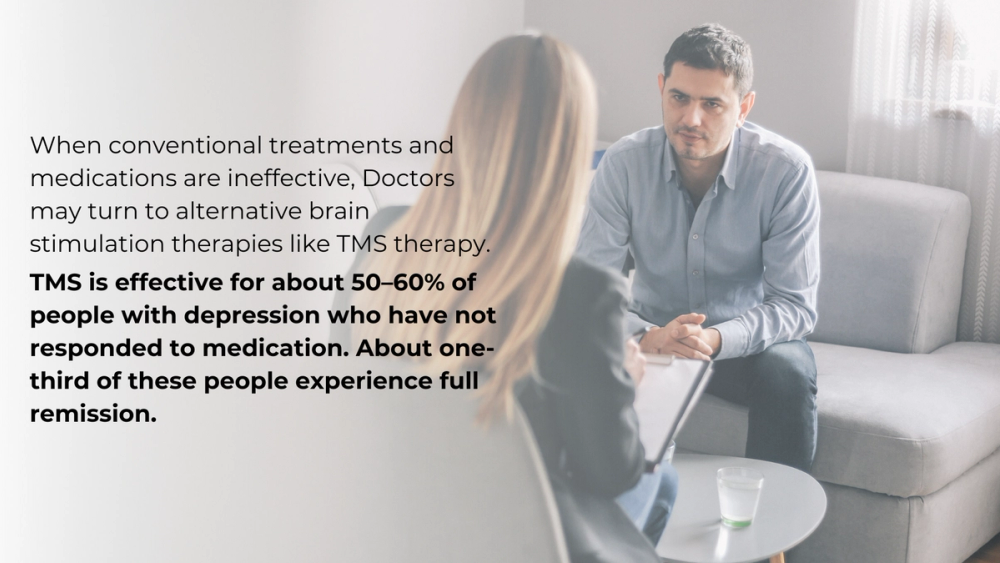
TMS may be a suitable treatment option for individuals who have struggled with traditional treatments, such as medication and psychotherapy. TMS for MDD (major depressive disorder) is also a safe and effective option for individuals unable to tolerate the side effects of medication or who prefer a non-invasive treatment.
If you are experiencing symptoms of depression, anxiety, or other mental health conditions and have not found fulfillment in traditional treatments, TMS may be right for you. However, speaking with a mental health professional to determine if TMS therapy is the right treatment option for your specific needs is essential.
At Clarity Clinic, we are committed to providing safe, effective, and compassionate care for our patients. Our mental health professional team has extensive experience administering TMS therapy for depression, obsessive-compulsive disorder, smoking cessation, and migraines. It has helped countless individuals find fulfillment from their symptoms.
We understand that seeking treatment for mental health conditions can be challenging, and we strive to create a supportive and welcoming environment for all our patients. Our team is dedicated to working with every individual to develop a personalized treatment plan that addresses their unique needs and goals. Book a consultation today for the best TMS therapy near you!
In addition to our expertise in providing TMS treatment, we offer a range of other mental health services, including medication management, psychotherapy, and group therapy. Our goal is to provide comprehensive care that addresses all aspects of our patient's mental health and well-being.


If you decide to pursue TMS therapy at Clarity Clinic, you can expect a comprehensive and personalized approach to care. Our team will begin with a thorough evaluation to determine if TMS is the right treatment option for you. If TMS is appropriate, we will work with you to develop a treatment plan that fits your specific needs and goals.
During your TMS sessions, our team will monitor your progress and adjust your treatment as needed to ensure that you are receiving the optimal level of care. We will also provide ongoing support and guidance to help you manage any side effects or challenges that may arise during treatment.
We understand that every individual's journey to recovery is unique, and we are committed to providing the support and resources necessary to help our patients achieve their goals.
There are many benefits to choosing TMS as a treatment option for depression and other mental health conditions. Here are just a few:
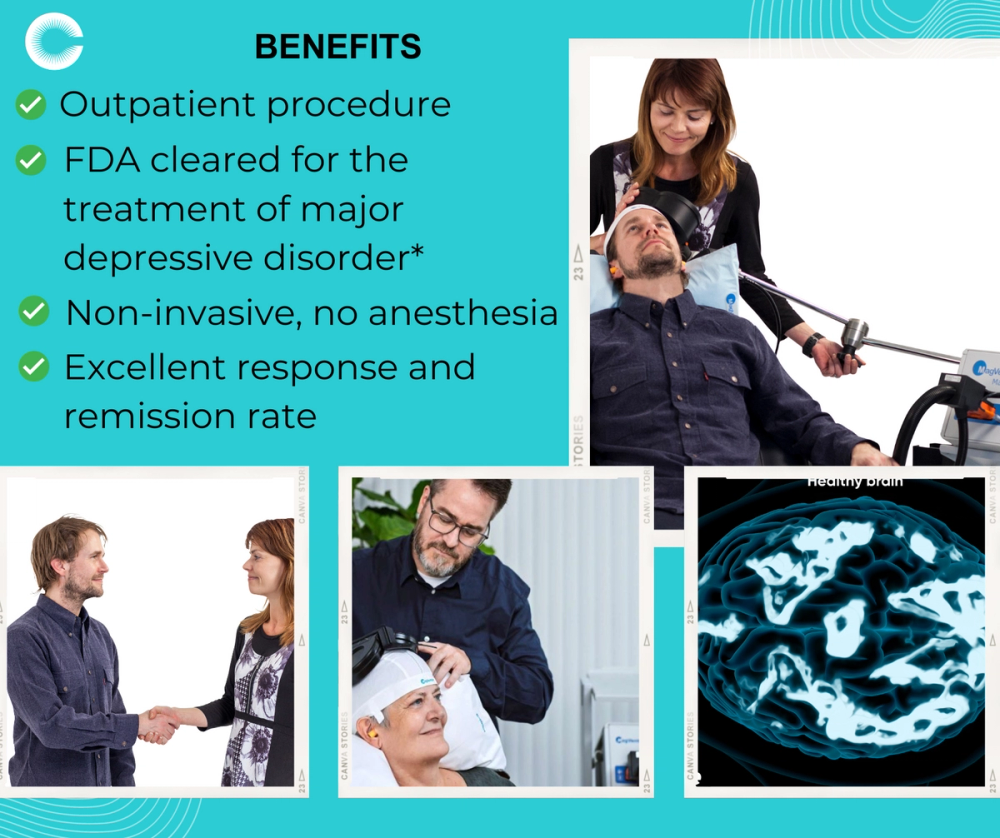
Transcranial Magnetic Stimulation (TMS) is characterized by its non-invasive nature, distinguishing it from other brain stimulation methods that may involve surgical procedures or more invasive interventions. Here's a detailed explanation of the non-invasive aspects of TMS in comparison to other brain stimulation methods:
1.External Application:
TMS: TMS is administered externally by placing a magnetic coil on the scalp. Magnetic pulses pass through the scalp and skull to stimulate targeted brain areas. No surgical incisions or internal devices are required.
Comparison: In contrast, deep brain stimulation (DBS) involves surgically implanting electrodes directly into specific brain regions, which can pose a higher risk due to the invasive nature of the procedure.
2.No Surgical Implants or Devices:
TMS: TMS does not involve the implantation of electrodes or any internal devices. The entire procedure is conducted externally, with the magnetic coil being the only equipment in direct contact with the patient.
Comparison: Other brain stimulation methods, such as vagus nerve stimulation (VNS), require the surgical implantation of a device, typically a small generator, under the skin.
3.Absence of Anesthesia:
TMS: TMS is typically performed without the need for anesthesia. Patients remain awake and alert during the procedure, contributing to its non-invasive nature.
Comparison: Some invasive procedures, like electroconvulsive therapy (ECT), often necessitate anesthesia due to the intensity of the treatment.
4.Outpatient Procedure:
TMS: TMS sessions are usually conducted on an outpatient basis. Patients can receive treatment and resume their daily activities immediately afterward, without the need for hospitalization or an extended recovery period.
Comparison: Invasive methods may require hospitalization, and patients may experience a more prolonged recovery period, especially after surgeries involving electrode implantation.
5.Reduced Risk of Infections and Complications:
TMS: As a non-invasive procedure, TMS carries a lower risk of infections and complications associated with surgical interventions or implanted devices.
Comparison: Surgical brain stimulation methods involve a higher risk of infection due to incisions and the presence of foreign materials within the body.
6.Minimal Discomfort:
TMS: TMS is generally well-tolerated, and patients may experience only mild discomfort or a tapping sensation on the scalp during the procedure. Adverse effects are typically temporary and localized.
Comparison: Surgical procedures, even those considered minimally invasive, can involve postoperative pain, discomfort, and a more extended recovery period.
In summary, the non-invasive nature of TMS makes it an attractive option for individuals seeking brain stimulation therapy with fewer associated risks, reduced recovery time, and enhanced overall comfort during the treatment process.
If you are struggling with depression, anxiety, or other mental health conditions, TMS may be the solution you've been looking for. At Clarity Clinic, we are committed to providing safe, effective, compassionate care to all our patients.
If you are interested in learning more about TMS and how it can help you find fulfillment from your symptoms, we encourage you to contact us today. Our team of mental health professionals is available to answer any questions and provide guidance on the best treatment options for your specific needs.
Don't let mental health conditions keep you from living your best life. Schedule a consultation and learn more about how TMS therapy can help you find fulfillment and improve your overall well-being. Our mental health professionals are here to support you every step of the way.
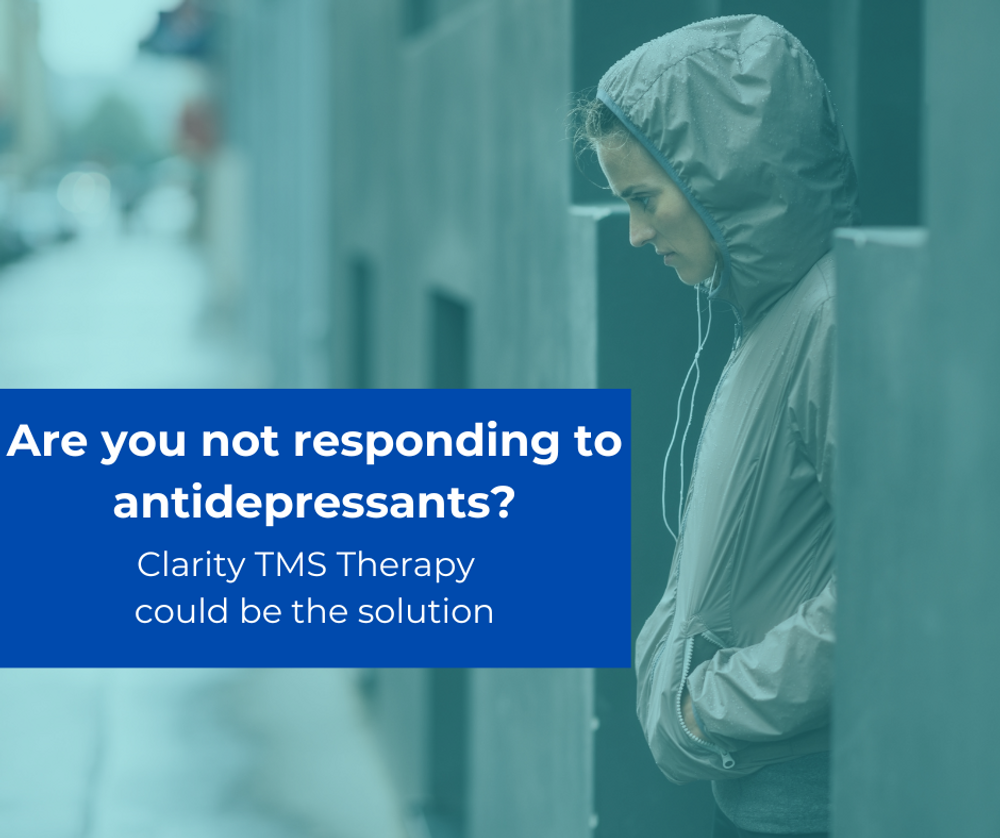
Our Services
Virtual/Online CarePHP and IOPAdult PsychiatryChild & Adolescent PsychiatryAdult TherapyChild & Adolescent TherapyCouples CounselingFamily TherapyGroup TherapyPsychological TestingTranscranial Magnetic Stimulation (TMS)